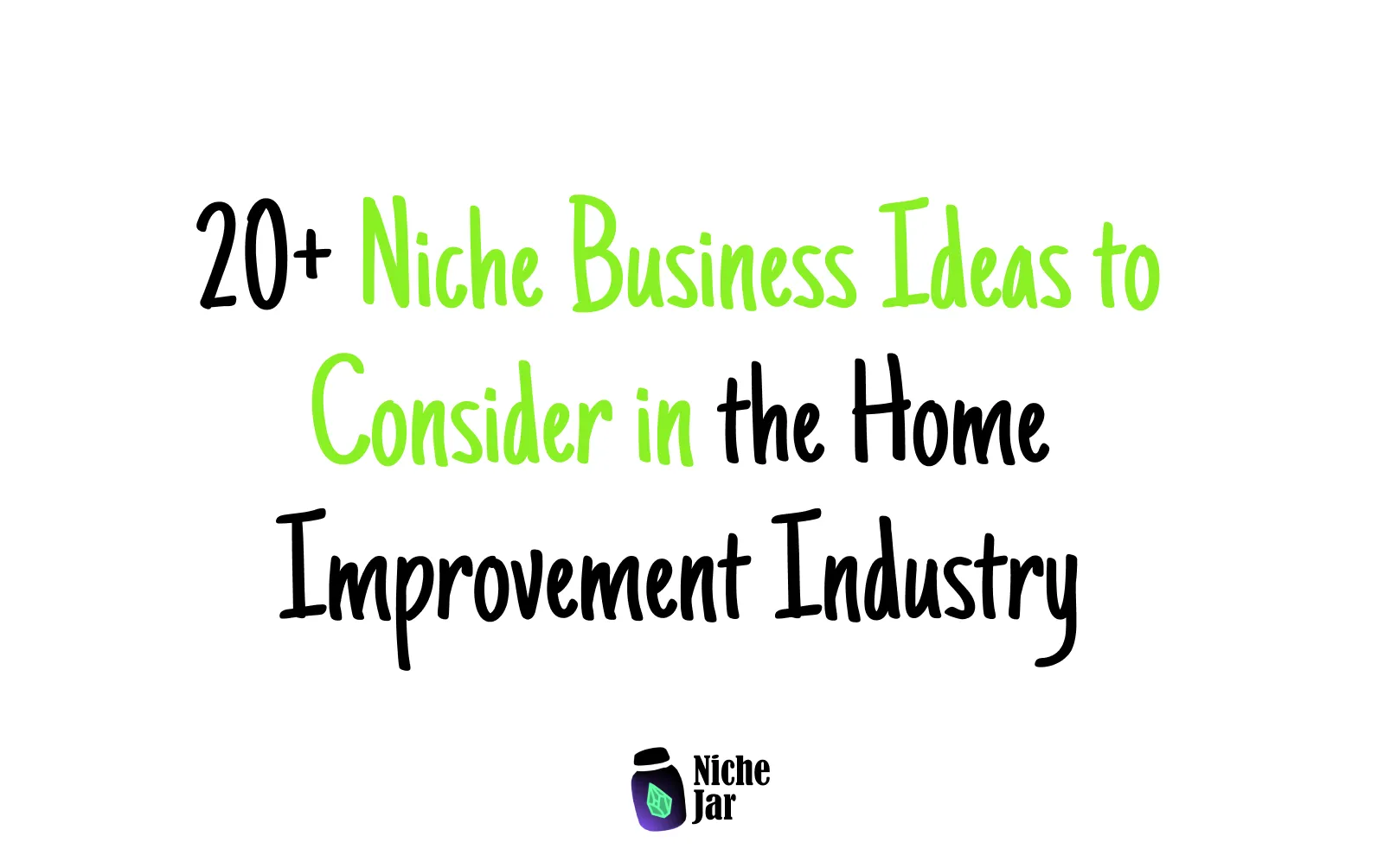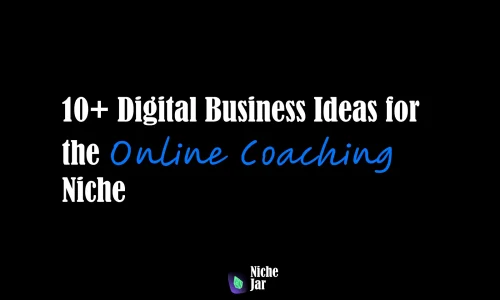- Senia
- 0 Comments
- 489 Views
Have you ever looked around your home and thought about how many small improvements could make it better? From what I’ve seen, the home improvement industry isn’t just about renovations—it’s full of profitable niche business ideas that everyday people can turn into real opportunities. If you’ve ever wondered how to start a business in this space, this post might give you some ideas worth exploring.
The home improvement industry has always been strong, but in recent years it has become one of the most approachable and profitable spaces for small businesses. More people are spending time at home, investing in comfort, sustainability, and style. Whether it’s a simple handyman service, eco-friendly upgrades, or custom furniture making, there are countless ways for everyday people to earn money in this field.
I believe this industry is meaningful because it connects directly to how people live. A home is personal—it’s where families gather, where we rest, and where we feel safe. Helping others improve their homes can also improve their lives. That’s why I see so much potential for humble entrepreneurs who want to build a business in this space.
In this post, I’ll share 20+ niche business ideas in the home improvement industry. For each idea, we’ll explore:
- Why it could be profitable
- Who the target audience might be
- Step-by-step suggestions on how to get started
- Potential challenges and simple solutions
- Estimated startup costs and ways to make money
- A short example or case study
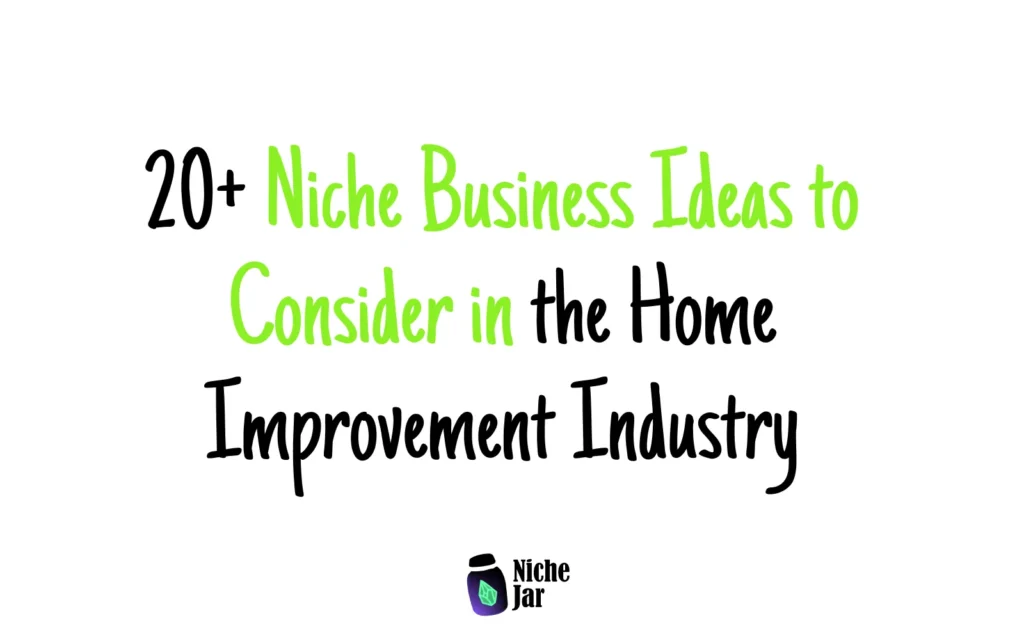
1. Handyman Services
Description: A flexible service business that helps with general repairs and small home projects.
Insights: Many homeowners need small fixes they can’t or don’t want to handle. This niche is broad but always in demand.
Steps to Start:
- Learn or refresh basic repair skills.
- Offer services locally (start small—ads on Facebook or community boards).
- Build trust with word-of-mouth referrals.
Challenges & Solutions: Hard to stand out—specialize (e.g., “handyman for seniors”).
Startup Costs: $500–$2,000 (tools, insurance, marketing).
Monetization: Hourly rates, package deals, recurring contracts.
Case Study: A retired carpenter started as a part-time handyman and now runs a small team serving his neighborhood.
2. Home Painting Business
Description: Interior and exterior painting services.
Insights: Painting is one of the simplest yet highest-impact improvements for homeowners.
Steps to Start:
- Invest in brushes, rollers, ladders, and drop cloths.
- Start with small projects like single rooms.
- Market through before-and-after photos.
Challenges & Solutions: Seasonal demand—offer indoor projects in winter.
Startup Costs: $1,000–$3,000.
Monetization: Per-room pricing, whole-house packages.
Case Study: A couple began painting homes on weekends, later growing into a full-time crew.
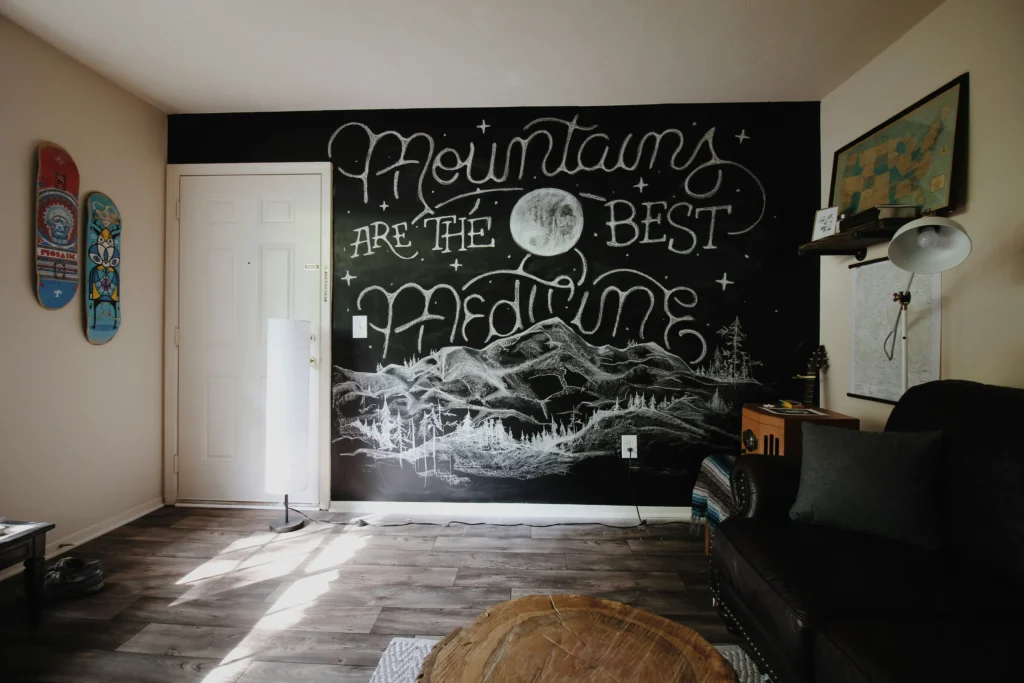
3. Custom Carpentry and Woodworking
Description: Build custom shelves, cabinets, or furniture.
Insights: Unique, handcrafted pieces attract homeowners who want personalization.
Steps to Start:
- Begin with small builds (floating shelves, storage benches).
- Share photos on Instagram/Etsy.
- Offer free consultations for local projects.
Challenges & Solutions: Woodworking tools are costly—start with secondhand equipment.
Startup Costs: $2,000–$10,000.
Monetization: Custom builds, Etsy shop, premium commissions.
Case Study: A hobbyist woodworker turned weekend projects into a steady side income.
4. Smart Home Installation Services
Description: Set up smart thermostats, lights, or security cameras.
Insights: The smart home market is booming, and many homeowners struggle with setup.
Steps to Start:
- Learn systems like Nest, Ring, or Philips Hue.
- Offer package deals (install + tutorial).
- Market to busy professionals.
Challenges & Solutions: Tech evolves quickly—stay updated with training.
Startup Costs: $500–$2,500.
Monetization: Flat-rate installs, consultation fees.
Case Study: A tech-savvy student installs smart devices locally while studying IT.
5. Kitchen and Bathroom Remodeling
Description: Specialize in updating kitchens and bathrooms, two of the most valuable areas in a home.
Insights: Remodeling adds significant resale value and is often a top priority for homeowners.
Steps to Start:
- Start with small remodels like cabinet refacing or new countertops.
- Partner with local suppliers for materials.
- Build a portfolio with before-and-after photos.
Challenges & Solutions: High upfront costs—begin by subcontracting small parts of larger jobs.
Startup Costs: $5,000–$25,000 depending on scope.
Monetization: Project-based pricing, design consultation, or bundled packages.
Case Study: A small remodeling team began with bathroom upgrades before expanding into full kitchen redesigns.
6. Eco-Friendly Home Upgrades
Description: Focus on green solutions like water-saving fixtures, insulation, or recycled materials.
Insights: Sustainability is a growing demand as homeowners look to save money and reduce their footprint.
Steps to Start:
- Learn about energy-efficient products.
- Market to environmentally conscious households.
- Offer packages like “green retrofit consultations.”
Challenges & Solutions: Higher upfront costs—educate clients on long-term savings.
Startup Costs: $1,500–$7,500.
Monetization: Installation fees, consultation services, product sales.
Case Study: An eco-consultant started with water-saving showerhead installs and grew into full-scale retrofits.

7. Landscaping and Outdoor Spaces
Description: Design and maintain outdoor areas, gardens, or patios.
Insights: Outdoor living is booming, especially with families investing in backyard spaces.
Steps to Start:
- Begin with lawn care or garden design.
- Market services seasonally.
- Build repeat clients through maintenance packages.
Challenges & Solutions: Seasonal income—offer snow removal or holiday decorating in off months.
Startup Costs: $2,000–$10,000.
Monetization: Maintenance contracts, design fees, installations.
Case Study: A teenager’s lawn-mowing service grew into a small landscaping company over five years.
8. Interior Design Consulting
Description: Provide advice on layouts, furniture, and colors to improve home interiors.
Insights: Many people want professional input without hiring a full-service designer.
Steps to Start:
- Offer affordable consultations (in-person or virtual).
- Use social media to showcase design ideas.
- Build packages (e.g., “1-hour consultation + design mood board”).
Challenges & Solutions: Clients may have limited budgets—offer scalable services like “virtual-only design.”
Startup Costs: $500–$2,000 (marketing, software, samples).
Monetization: Flat-rate consults, e-design services, affiliate links to furniture retailers.
Case Study: A teacher with a passion for design started an Instagram account and began booking clients virtually.
9. Flooring Installation and Repair
Description: Specialize in hardwood, laminate, vinyl, or tile flooring.
Insights: Floors get worn quickly, so homeowners frequently upgrade.
Steps to Start:
- Train in one flooring type (start small).
- Build relationships with material suppliers.
- Market locally with competitive rates.
Challenges & Solutions: Installation can be labor-intensive—consider subcontractors for larger jobs.
Startup Costs: $2,000–$8,000.
Monetization: Per-square-foot installation, repair services.
Case Study: A small flooring business grew by specializing in eco-friendly bamboo flooring.
10. Home Cleaning and Organization Services
Description: Go beyond cleaning to offer organization solutions like closets and storage.
Insights: Busy households value convenience and neatness.
Steps to Start:
- Offer bundled cleaning + organizing services.
- Create a simple pricing model (by room or project).
- Build trust through testimonials.
Challenges & Solutions: Competition is high—differentiate by focusing on specialized organization.
Startup Costs: $500–$2,500.
Monetization: Hourly cleaning rates, package deals, organizing consults.
Case Study: A stay-at-home parent turned weekend cleaning jobs into a recurring monthly income stream.
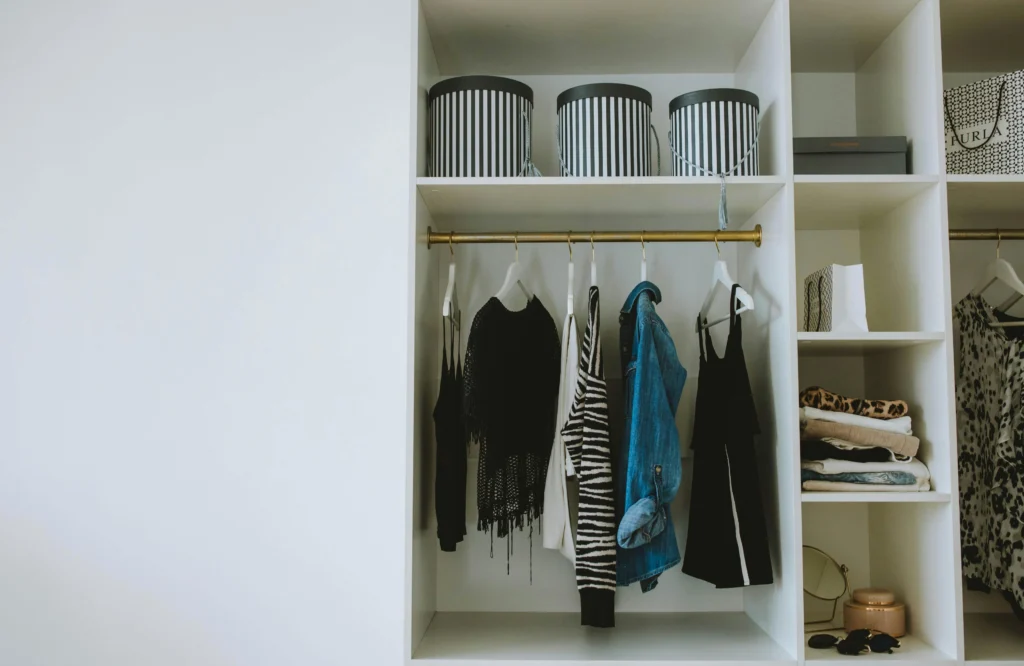
11. Energy Efficiency Consulting
Description: Help homeowners reduce utility bills through audits and upgrades.
Insights: Rising energy costs are pushing families to seek efficiency.
Steps to Start:
- Learn to conduct energy audits.
- Partner with contractors for actual installations.
- Offer audit + recommendation reports.
Challenges & Solutions: Requires technical knowledge—take certification courses.
Startup Costs: $1,000–$5,000.
Monetization: Consultation fees, referral commissions from upgrades.
Case Study: An engineer started offering part-time audits and grew into a consulting firm.
12. Window and Door Replacement
Description: Focus on energy-efficient and modern replacement options.
Insights: New windows and doors improve energy savings and home value.
Steps to Start:
- Train in measuring and installing.
- Market to older homes in your area.
- Partner with manufacturers for bulk pricing.
Challenges & Solutions: Heavy lifting and technical work—hire assistants as you grow.
Startup Costs: $3,000–$12,000.
Monetization: Installation fees, supplier commissions.
Case Study: A small business started with window screen repairs and grew into full replacements.
13. Roofing and Gutter Services
Description: Repair or replace roofs and gutters.
Insights: Homeowners can’t ignore leaks—this niche always has demand.
Steps to Start:
- Begin with gutter cleaning or small repairs.
- Build safety skills and get proper insurance.
- Scale to roof replacements.
Challenges & Solutions: High liability—safety gear and insurance are essential.
Startup Costs: $5,000–$20,000.
Monetization: Per-project pricing, maintenance contracts.
Case Study: A handyman expanded into full roofing jobs after years of gutter work.
14. DIY Home Improvement Blogging/YouTube
Description: Create content teaching others how to do projects.
Insights: DIY content is hugely popular on YouTube, Pinterest, and blogs.
Steps to Start:
- Pick a specific niche (e.g., budget-friendly DIY).
- Create tutorials with photos or videos.
- Monetize with ads, affiliates, or sponsorships.
Challenges & Solutions: Growth is slow—focus on consistent publishing.
Startup Costs: $300–$2,000.
Monetization: YouTube ads, affiliate links, digital products.
Case Study: A DIY blogger now earns passive income from ebooks and tutorials.

15. Property Staging for Real Estate
Description: Prepare homes for sale with temporary furniture and décor.
Insights: Staged homes often sell faster and for higher prices.
Steps to Start:
- Build an inventory of versatile furniture.
- Network with local realtors.
- Start with affordable “virtual staging” using software.
Challenges & Solutions: High upfront furniture costs—rent pieces at first.
Startup Costs: $2,000–$10,000.
Monetization: Per-project staging fees.
Case Study: A stager began with digital designs and now stages multiple homes monthly.
16. Home Security Installation
Description: Install security cameras, motion sensors, and alarms.
Insights: Security concerns continue to grow, especially in urban areas.
Steps to Start:
- Learn to install basic systems.
- Market to families and small businesses.
- Offer packages (basic, advanced, smart).
Challenges & Solutions: Tech changes quickly—stay updated with suppliers.
Startup Costs: $1,000–$5,000.
Monetization: Installation fees, subscription support.
Case Study: A tech hobbyist started installing security cameras locally on weekends.
17. Furniture Upcycling and Restoration
Description: Refurbish old furniture into stylish, modern pieces.
Insights: Sustainability and unique designs are attractive to buyers.
Steps to Start:
- Source cheap or free furniture from thrift shops.
- Refurbish using paint, polish, or new hardware.
- Sell on Etsy, Facebook Marketplace, or local shops.
Challenges & Solutions: Requires creativity—start with small projects like chairs.
Startup Costs: $500–$2,000.
Monetization: Direct sales, custom commissions.
Case Study: A hobbyist refinisher grew an Instagram following and now sells furniture full-time.
18. Decluttering and Downsizing Services
Description: Help families organize and reduce belongings, especially during moves.
Insights: Minimalism and “tidy living” trends are rising.
Steps to Start:
- Offer decluttering by room or whole-home.
- Partner with moving companies or senior living centers.
- Build testimonials from early clients.
Challenges & Solutions: Emotional resistance—approach clients gently.
Startup Costs: $300–$1,500.
Monetization: Hourly rates, package services.
Case Study: A declutterer helped seniors downsize and built a niche around retirement moves.
19. Specialized Storage Solutions
Description: Build or design custom storage like closets, garages, or pantries.
Insights: Small homes often need creative storage.
Steps to Start:
- Start with simple closet organizers.
- Partner with contractors for large builds.
- Showcase projects online.
Challenges & Solutions: Requires carpentry skills—begin with modular kits.
Startup Costs: $1,000–$7,000.
Monetization: Design fees, installation.
Case Study: A storage specialist grew by focusing on tiny home solutions.
20. Seasonal Home Maintenance
Description: Offer recurring seasonal services like gutter cleaning, power washing, or snow removal.
Insights: Seasonal upkeep is often neglected, so demand is steady.
Steps to Start:
- Offer packages (spring clean, fall prep).
- Market door-to-door or online locally.
- Build recurring annual clients.
Challenges & Solutions: Work is cyclical—plan cash flow ahead.
Startup Costs: $500–$3,000.
Monetization: Seasonal packages, subscriptions.
Case Study: A college student started with leaf cleanup and grew into a full-service maintenance company.
21. Solar Panel Installation Support
Description: Help with solar panel installation or consultation.
Insights: Solar energy is a rapidly growing market.
Steps to Start:
- Train with certified installers.
- Offer consultation + referral services.
- Market to eco-conscious households.
Challenges & Solutions: Requires technical training—start as a support consultant.
Startup Costs: $2,500–$15,000 depending on services.
Monetization: Consultation fees, subcontracting, referral commissions.
Case Study: An eco-entrepreneur began as a solar consultant before branching into installations.
22. Small-Scale Rental Property Maintenance
Description: Provide ongoing upkeep for rental homes or apartments.
Insights: Landlords often need reliable contractors for routine fixes.
Steps to Start:
Provide simple online scheduling.
Challenges & Solutions: Unpredictable calls—set clear service boundaries.
Startup Costs: $1,000–$5,000.
Monetization: Monthly contracts, per-job fees.
Case Study: A handyman secured three landlords as clients and built consistent income.
The home improvement industry is full of opportunities, but the truth is that none of these ideas work overnight. From what I’ve seen, the people who succeed are those who start small, learn as they go, and stay consistent even when it feels slow.
If one of these business ideas caught your attention, take the next step by doing a little more research or testing it on a small scale. Remember, every journey starts with a single step, and even the simplest service—like painting a room or fixing a shelf—can grow into something bigger if you keep at it.
If you’d like to keep exploring, you can find more guides on Nichejar.com about niche research, side hustles, and practical ways to make money both online and offline. I’d love to hear your thoughts in the comments: Which of these ideas feels most realistic for you?
Keep going—you might be surprised where your skills can take you.
TLDR
In short: here are some of the most profitable home improvement niche ideas to consider:
- Handyman Services – low startup costs, always in demand.
- Home Painting – quick projects, high visual impact.
- Custom Carpentry – personalized builds, premium pricing.
- Smart Home Installation – growing tech market.
- Eco-Friendly Upgrades – sustainable demand.
- Interior Design Consulting – virtual or in-person guidance.
- Furniture Upcycling – creative, low-cost entry.

